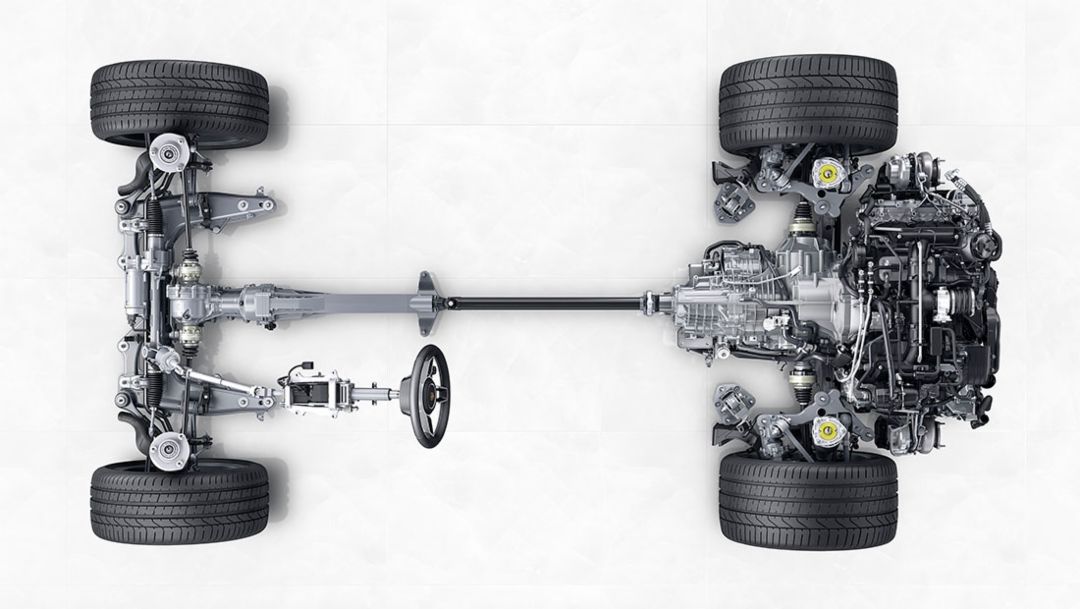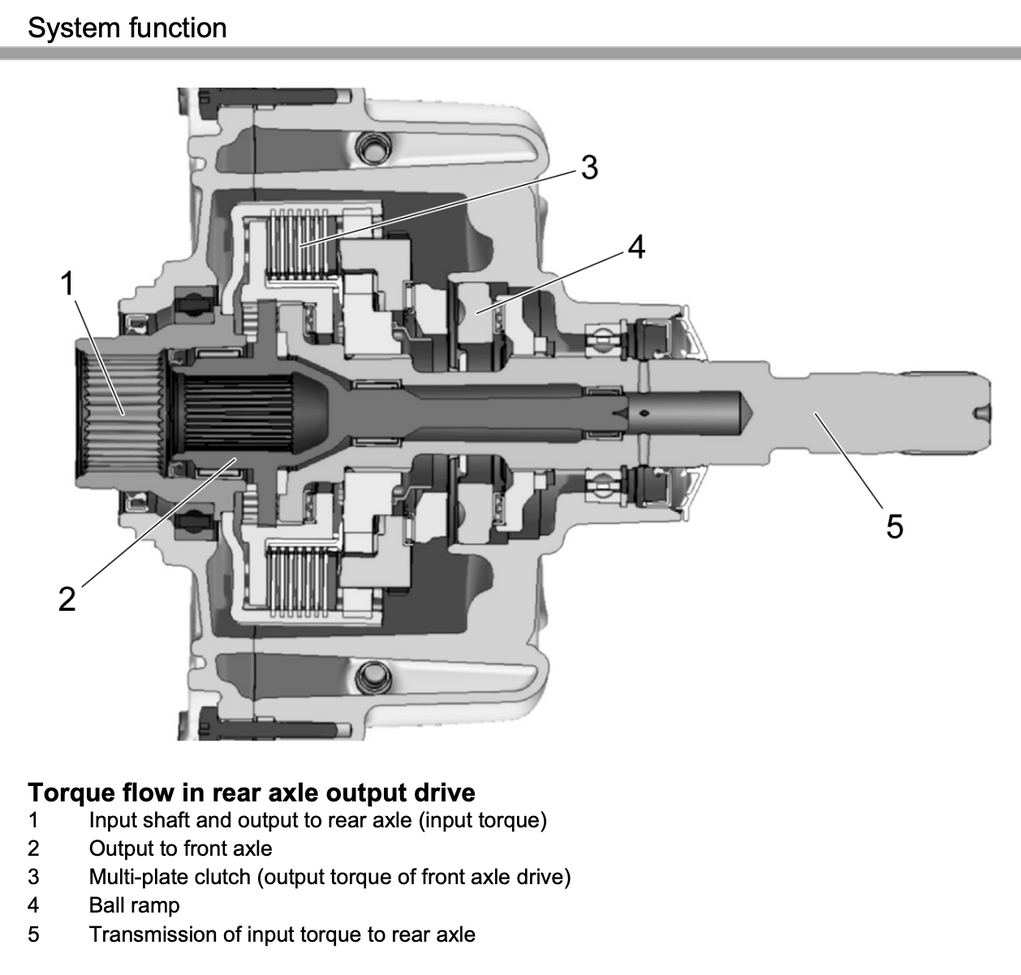

|
|
 |
 |
 |

|
 |
BMW Garage | BMW Meets | Register | Today's Posts | Search |
 |

|
BMW 3-Series (E90 E92) Forum
>
How does Porsche 911 (992) AWD work?
|
 |
| 06-05-2024, 03:48 PM | #1 |
|
Major General
  5290
Rep 5,110
Posts |
How does Porsche 911 (992) AWD work?
sorry to be asking this but i really can't find anything on the internet
for example the Turbo/S has true staggered wheels (rear larger than front), rear engine, anyone can point me to a website that explains how the mechanics of the AWD system? i've seen the Turbo S drift all day and the transfer case doesn't explode like BMW transfer cases if drifting in AWD just very very curious on the nitty gritty of that system many thanks Last edited by G30M; 06-06-2024 at 07:37 PM.. |
| 06-05-2024, 05:52 PM | #2 |
|
Colonel
 8087
Rep 2,508
Posts
Drives: 9Y0 Cayenne S
Join Date: Mar 2019
Location: Einbahnstraße
|
911 or another model?
911 rear axle is integral with the transmission. Transmission output shaft sends torque to the front axle. 997 used an electronically controlled ball-ramp to vary torque between front and rear axles. Same principle used in 992, Macan and Cayenne today. https://newsroom.porsche.com/en/hist...rbo-15046.html 2006: The first 911 with PTM In 2006, with the Type 997 911 Turbo, Porsche presented a PTM version that had been enhanced specifically for sports cars; it featured an electronically controlled and electro-magnetically actuated multi-plate clutch with ball ramp reinforcement. This active, fully variable system distributes propulsion force between the permanently driven rear axle and the front axle much more quickly and accurately than the passive viscous coupling used in the previous version. In 2008, this system was also used in the 911 Carrera 4 models of the second generation of 997; in the first generation, they still had the all-wheel drive with viscous coupling. 992 PTM (news release from 2018 so I assume 992)   https://newsroom.porsche.com/en/inno...ics-15050.html The technical basic function of Porsche Traction Management is the same across all model lines: As with a conventional rear-wheel drive, engine power is transmitted directly to the rear axle via the transmission. In principle, this means that every Porsche features the easy-to-control handling of a rear-wheel-drive. A second downforce on the transmission output is directed to a multi-plate clutch, via which the front axle drive can be engaged on a fully variable basis. With this hang-on system, two features in particular truly demonstrate the expertise involved: the intelligent control algorithm and the responsiveness of the system. 991 transmission showing how torque is delivered to the rear axle  991 front axle. The coupling is on the left, in the closeup photo. Same device in the Cayenne. A multiplate wet clutch controlled by a ball-ramp mechanism. Last edited by chassis; 06-05-2024 at 09:28 PM.. |
| 06-06-2024, 12:17 PM | #3 |
|
Colonel
 8087
Rep 2,508
Posts
Drives: 9Y0 Cayenne S
Join Date: Mar 2019
Location: Einbahnstraße
|
Regarding “exploding transfer cases”.
The current gen front engined Porsches with ZF or PDK use the so-called “hang-on” wet multiplate coupling for front-rear torque transfer. No traditional transfer case as in 958 or gen 1 Macan. 911 never used a traditional transfer case because of rear engine layout. Said torque coupling is widely used in current model Audi setups and I think Bentayga and Urus. MB 167 GLE/GLS use a similar concept as VAG and have abandoned the legacy truck-style chain-type transfer case. G-Wagen and pickup trucks continue with the old style t/cases with a chain. Haven’t checked the latest 4Runner. The 958, 955/957 and contemporary Macan chain-type transfer cases were weak, to make an understatement. |
|
Appreciate
1
G30M5290.00 |
| 06-06-2024, 02:54 PM | #4 | |
|
Major General
  5290
Rep 5,110
Posts |
Quote:
the TTS tires are 3.3% different being true staggered just wondering how the AWD is set up in this regards |
|
|
Appreciate
0
|
| 06-06-2024, 04:11 PM | #5 | |
|
Brigadier General
 3459
Rep 3,010
Posts
Drives: 2020 M4 ZCP / 2023 X3 M40i
Join Date: May 2005
Location: Northern VA
|
Quote:
Looks like the circumference difference is built into their AWD system. https://rennlist.com/forums/997-turb...tyre-size.html https://rennlist.com/forums/997-foru...questions.html |
|
|
Appreciate
0
|
| 06-06-2024, 06:20 PM | #6 |
|
Colonel
 8087
Rep 2,508
Posts
Drives: 9Y0 Cayenne S
Join Date: Mar 2019
Location: Einbahnstraße
|
Common practice is to use unequal final drive ratios in front vs rear axles. As stated in one of the RL threads.
Car companies (e.g. current Porsche, Audi and MB models) can therefore create a specified constant delta rpm across the north-south multiplate wet clutch device to create a constant torque bias, or none at all. |
|
Appreciate
1
G30M5290.00 |
| 06-06-2024, 07:34 PM | #7 |
|
Major General
  5290
Rep 5,110
Posts |
there is a vacuum of technical posts on Porsche forums that i have managed to google
and it seems there are a number of Porsche drivers here so I thought I'd try my luck here to find where the Porsche geeks are lurking |
|
Appreciate
1
chassis8087.00 |
| 06-06-2024, 09:52 PM | #8 |
|
Colonel
 8087
Rep 2,508
Posts
Drives: 9Y0 Cayenne S
Join Date: Mar 2019
Location: Einbahnstraße
|
Magna Flex4 coupling used by VAG in Porsche and Audi applications. Specifically RS5, Cayenne, Macan, Panamera and 911. Not sure about Cayman/Boxster.
This device allows differentiation between front and rear propshafts. It replaces the bevel gear differential found in old school chain-type transfer cases. Note that shaft 1 directly drives shaft 5 100% of the time. 1 and 5 are connected to outside-teeth clutch plates in clutch 3. Shaft 2 is connected to inner-teeth clutch plates and is driven by preload on the plates + applied load from the ball ramp 4. In full lockup the plates are compressed together and front and rear axles are locked together. If good traction is present at both axles, tire slip is induced to allow differentiation required by the net result of tire size and final drive differences. If one axle loses grip, torque is sent to either the rear axle requiring no electronic clutch actuation, or to the front axle with electronic coupling actuation, or full coupling lockup, depending on driving conditions.  Last edited by chassis; 06-08-2024 at 03:49 PM.. |
|
Appreciate
1
G30M5290.00 |
| 06-07-2024, 12:57 AM | #9 | |
|
Major General
  5290
Rep 5,110
Posts |
Quote:
Why do I suddenly have the urge to save up for this thing |
|
|
Appreciate
1
chassis8087.00 |
| 06-07-2024, 01:11 AM | #10 | |
|
Forced Induction Connoisseur
1195
Rep 928
Posts
Drives: 23 X5MC / 23 720s
Join Date: Aug 2020
Location: AZ
iTrader: (0)
Garage List 2023 BMW X3MC [0.00]
2023 Mclaren 720s [0.00] 2005 Honda S2000 [0.00] 2023 BMW X5MC [0.00] 1964 Ford Mustang [0.00] 1968 Pontiac GTO [0.00] |
Quote:
What I've learned is the higher in the marque price scale you go, the less technical most car guys are, right up until you hit stuff like Pagani and Koenigsegg, where there is a more substantial amount.
__________________
Oy vey, look at all these shekels
|
|
|
Appreciate
1
chassis8087.00 |
| 06-07-2024, 08:52 PM | #11 |
|
Colonel
 8087
Rep 2,508
Posts
Drives: 9Y0 Cayenne S
Join Date: Mar 2019
Location: Einbahnstraße
|
The video is 991 but 992 uses the same principle. Start at 1:27 in the video.
Last edited by chassis; 06-07-2024 at 09:38 PM.. |
|
Appreciate
0
|
| 06-08-2024, 12:42 PM | #12 |
|
Colonel
 8087
Rep 2,508
Posts
Drives: 9Y0 Cayenne S
Join Date: Mar 2019
Location: Einbahnstraße
|
Another view of the 992 PDK showing primary output to rear axle (left side of image, near bell housing), and secondary output to front axle and torque coupling.
 |
|
Appreciate
0
|
 |
| Bookmarks |
|
|